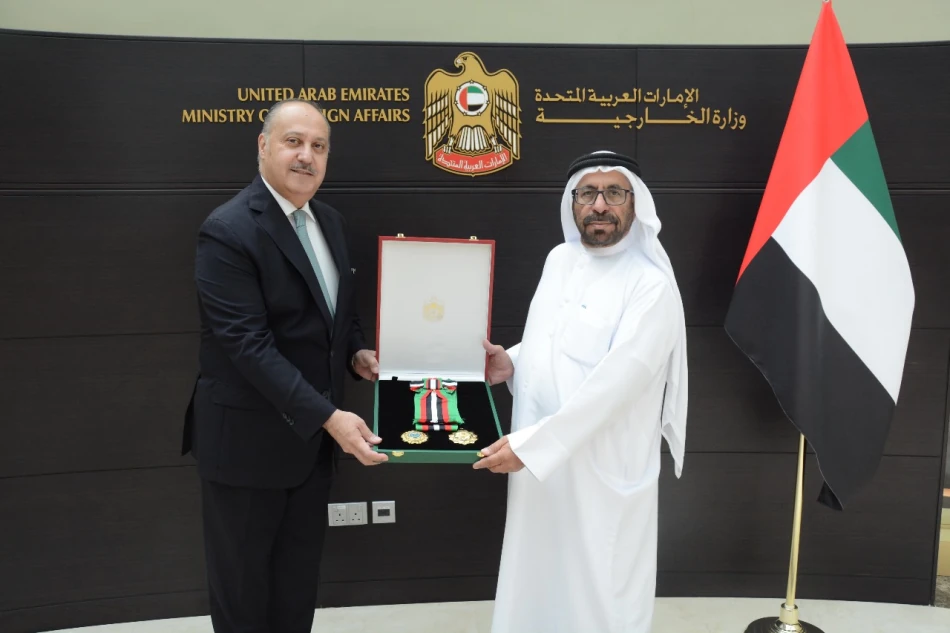
UAE President Honors Jordanian Ambassador with Prestigious Independence Order
UAE Awards Top Honor to Jordanian Ambassador as Gulf Diplomacy Strengthens Regional Ties
The UAE has awarded its highest diplomatic honor, the First Class Order of Independence, to Jordan's Ambassador Nassar Ibrahim Al-Habashna, signaling the deepening strategic partnership between the two nations amid broader Gulf efforts to consolidate regional influence. The recognition highlights how smaller Arab states are leveraging enhanced diplomatic coordination to navigate an increasingly complex Middle Eastern landscape.
Strategic Recognition Beyond Protocol
Sheikh Mohamed bin Zayed Al Nahyan, UAE President, personally approved the award for Ambassador Al-Habashna in recognition of his efforts to strengthen bilateral relations during his diplomatic tenure. The ceremony, conducted by Minister of State Khalifa bin Shaheen Al Marar at the Foreign Ministry's Dubai office, represents more than ceremonial diplomacy—it reflects the UAE's calculated approach to building a network of reliable regional partnerships.
The timing of this recognition is particularly significant as Gulf states seek to diversify their diplomatic portfolios beyond traditional Western alliances, focusing instead on strengthening intra-Arab cooperation mechanisms that can withstand regional volatility.
Economic Underpinnings of Diplomatic Success
Trade and Investment Momentum
The UAE-Jordan relationship has evolved into a substantial economic partnership, with bilateral trade volumes reaching new heights in recent years. Jordan's strategic location as a gateway to the Levant complements the UAE's position as a regional business hub, creating natural synergies that extend beyond diplomatic courtesy.
For investors and regional businesses, this strengthened diplomatic framework signals greater predictability in cross-border operations, potentially opening new opportunities in sectors ranging from logistics to renewable energy projects that both countries are prioritizing.
Regional Stability Premium
Ambassador Al-Habashna's success in fostering cooperation reflects a broader trend where moderate Arab states are creating stability networks that can weather regional storms. Unlike the more volatile relationships that have characterized Middle Eastern diplomacy in recent decades, the UAE-Jordan partnership represents a model of pragmatic cooperation that prioritizes economic development over ideological positioning.
Broader Implications for Gulf Diplomacy
This diplomatic recognition occurs as the UAE continues to position itself as a regional mediator and economic anchor. Similar to Singapore's approach in Southeast Asia, the UAE is building a web of strong bilateral relationships that enhance its strategic autonomy while providing smaller regional partners with access to global markets and investment flows.
The emphasis on mutual interests and shared aspirations mentioned during the ceremony reflects a departure from traditional patron-client relationships, suggesting a more mature approach to regional cooperation that could serve as a template for other Middle Eastern partnerships.
Looking Forward: Institutionalizing Success
Ambassador Al-Habashna's expression of gratitude toward UAE government agencies points to the institutional depth of this relationship—a factor that typically ensures diplomatic gains survive personnel changes and political transitions. This institutional approach mirrors successful diplomatic models in other regions where personal relationships are backed by robust bureaucratic frameworks.
As both countries face similar challenges in economic diversification and regional security, their enhanced cooperation provides a foundation for addressing shared concerns through coordinated policy responses rather than competing approaches.
Most Viewed News

 Sara Khaled
Sara Khaled






